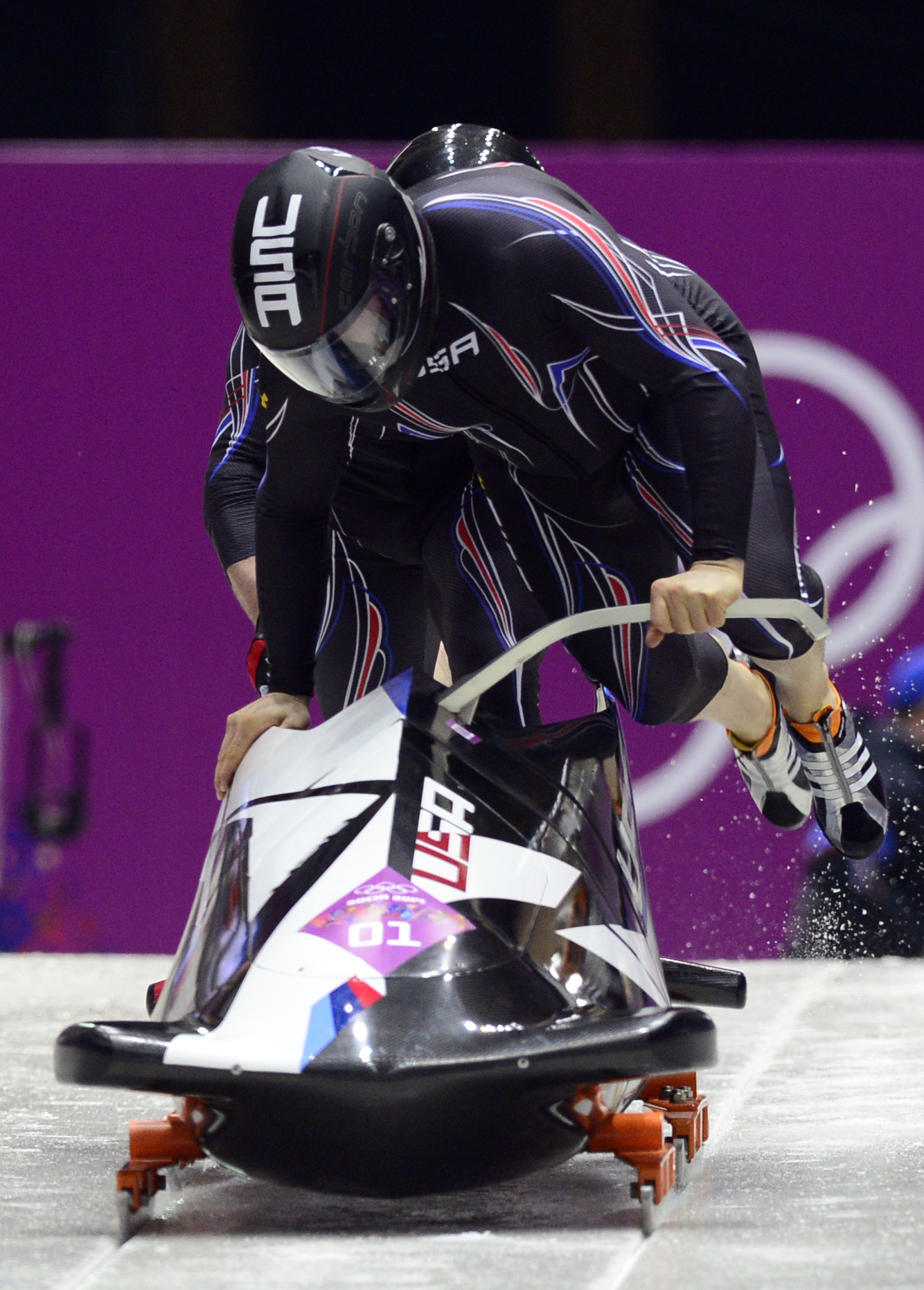![USATSI_7745307 [ID=5567939]](http://moc-assets-prod.gannett-cdn.com/-mm-/db7538b2d4126b7475193460b75989946ee427ef/r=286x400/local/-/media/WTLV/WTLV/2014/02/17/1392689446000-USATSI-7745307.jpg)
KRASNAYA POLYANA, Russia — Expectations for USA-1 bobsled pilot Steve Holcomb were high in the Sochi Olympics two-man event.
He captured the World Cup points title, winning five of eight races in the fast, new BMW sled, and gold seemed realistic. It would have ended a 78-year gold-medal drought in two-man for the USA.
But after watching Russia pilot Alexander Zubkov nail the intricacies of the 17-curve, 4,921-feet track — with uphill sections — at the Sanki Sliding Center on Monday, Holcomb and brakemen Steve Langton will take their bronze and celebrate.
"We came here to get a gold, but a medal's a medal," Holcomb said. "I'm walking home an Olympic medalist. That's pretty badass. I'm happy with that. Gold, silver or bronze, I'm happy to win a medal. I have a four-man gold medal, I have a four-man world championship. I didn't have any Olympic anything for two-man. To come away with a bronze is still fantastic."
After all, that medal is the first in two-man for the USA since the 1952 Oslo Olympics. It's even more impressive considering Holcomb strained his left calf on the start of his second run Sunday, and U.S. men's bobsled coach Brian Shimer didn't know if Holcomb would be able to race in the final two heats Monday.
"It was a pretty dismal night wondering if he was even going to be able to go (Monday) or make it worse and pull out of the four-man," Shimer said.
Holcomb received treatment through the night and most of the day Monday — acupuncture, kinesiology tape and stimulation therapy.
"Had a game plan to come out and run next to the sled and let my horse (Langton) here take over," Holcomb said. "He did a fantastic job. After the run I realized I could push a little harder than I expected. Going into the last heat sitting in third place you've got to give it all you've got."
Even if Holcomb had been 100%, no one was catching Zubkov on this track — possibly foreshadowing the four-man event this weekend.
Zubkov won the first two-man gold for Russia since the Soviet Union dissolved.
![USATSI_7745543[ID=5538911] ID=5538911](http://www.gannett-cdn.com/-mm-/be41c8805ae26de614bd51207423dc2066814f37/c=268-0-4502-3164&r=115x86/local/-/media/WTLV/WTLV/2014/02/16//1392600585010-USATSI-7745543.jpg)
He had a four-run time of 3:45.39, 0.66 seconds ahead of silver-medalist Beat Hefti of Switzerland. He set a track record in the third heat in 56.08 seconds, breaking the mark he set one day earlier.
Zubkov is a better four-man pilot and finished third at the World Cup event here a year ago. He will try to become just the sixth pilot to win two-man and four-man gold in the same Olympics.
How much did the home-track advantage help? Zubkov didn't win a World Cup race this season and was on the podium three times in seven races. As a pilot, he hasn't won a World Cup race since late in the 2010-11 season. In fact, Zubkov finished fourth on this track in two-man a year ago.
But between then and Monday, Zubkov took as many runs as possible here. He even skipped the final World Cup race this season to go home and get more practice on this track. Holcomb said he had about 40-some runs on the track, and U.S. bobsledder Chris Fogt estimates Zubkov had between 300 and 400 runs.
"We analyzed the Sochi track very carefully and very thoroughly," said Zubkov, whose brakeman Alexey Voevoda is from Sochi. "We have shown that we know this track better than anyone else. We've done everything right."
Zubkov also dispelled a Russian jinx that the flag bearer for the opening ceremony won't win a medal.
"Now you see it's just superstition," he said.
The most difficult heat for Holcomb was the second one, immediately after he strained his calf at the start and before he had to hop in the sled. For the next 50 seconds, he had to navigate a technical course where medals disappear with one mistake.
"I jumped in the sled and what sucks is you get in the sled with a minute to go and you can't just get out and be like 'Ow,' " Holcomb said. "You're trying to focus on the drive and all you can think of is that your leg hurts. It's a really tight fit and so you're cramping up inside the sled and trying to move and keep your foot at the right angle to keep it stretched."
![Get an inside look at Team USA's BMW bobsled[ID=5551697] ID=5551697](http://bc_gvpc.edgesuite.net/img/963482463001/201402/163/963482463001_3216168145001_thumbnail-for-video-3215289393001.jpg?pubId=963482463001)
He completed Sunday's two heats in third place but with his ailing calf making his start time slower, Holcomb needed two outstanding runs to finish on the podium.
Holcomb held off Russia-2 pilot Alexander Kasjanov by .03, ending the 62-year drought in two-man. At the 2010 Olympics in Vancouver, Holcomb ended the USA's 62-year streak without a gold in four-man.
"This is my second 62-year drought, which is awesome," Holcomb quipped. "If anyone has another 62-year drought they need to break, let me know. I'll try to help you."
Holcomb turned serious right away.
"This is overwhelming," he said. "There's so much that's gone behind us. Myself, Steve and the hard work we've gone through. The coaching staff, the sports medicine staff, the strength and conditioning staff. BMW designed the sled. There's dozens of people behind this team. We may be the two standing up here, but we have a huge team behind us pushing us."
Shimer and the medical staff were concerned about Holcomb's status for Monday's two heats, but Holcomb and Langton weren't.
"I just assumed he'd be at the start block when I got there," Langton said. "Luckily, I was right."
Withdrawing from the two-man to concentrate on the four-man wasn't a serious consideration.
"This is four years to get to this point," Holcomb said. "I'm not going to let a little calf boo-boo stop me."
![Photos: Two-man bobsled competition[ID=5538721] ID=5538721](http://www.gannett-cdn.com/-mm-/db7538b2d4126b7475193460b75989946ee427ef/r=286x400/local/-/media/WTLV/WTLV/2014/02/16/1392600585000-USATSI-7745307.jpg)

